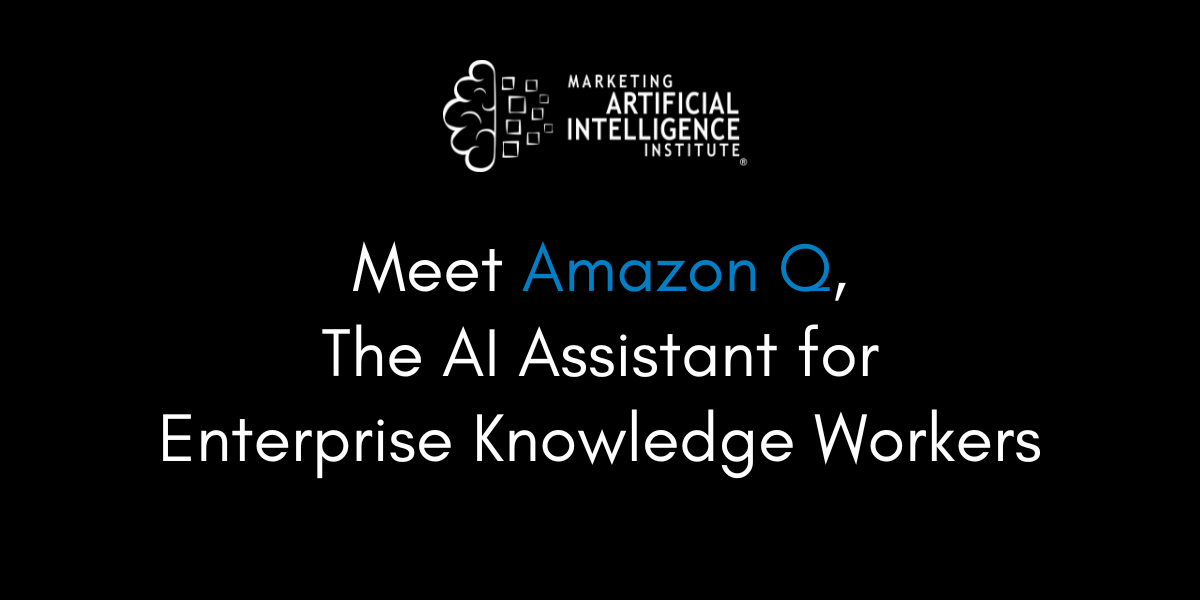Amazon has generally released Amazon Q, its AI-powered assistant designed to supercharge productivity for internal teams...
And the news marks a major milestone in the race to bring generative AI to the enterprise.
The big draw here for marketing and business leaders is Amazon Q Business, an AI assistant for knowledge workers. (Amazon also released Q Developer.)
Says the company of Q Business:
"Amazon Q Business makes it easy for users to get answers to questions like company policies, products, business results, or code, using its web-based chat assistant. You can point Amazon Q Business at your enterprise data repositories, and it’ll search across all data, summarize logically, analyze trends, and engage in dialog with users."
Q Business can also connect to over 40 popular enterprise data sources and store document and permission information, so everyone can access data and content securely.
As a result, Q Business could have huge implications for enterprise AI adoption.
Why?
I got the answer from Marketing AI Institute founder and CEO Paul Roetzer on Episode 96 of The Artificial Intelligence Show.
Sign up for the security benefits...
A key selling point of Amazon Q Business is its ability to connect with over 40 popular enterprise data sources like Microsoft 365 and Salesforce. Crucially, it respects existing data permissions and access controls.
That's a big deal, says Roetzer. "You have to have generative AI chatbots, if you're using them for internal purposes, that follow those permissions."
This has been a big barrier to enterprise AI adoption. But now that major providers are beginning to solve for it, the sky's the limit.
"Microsoft, Google, and Amazon have just such a massive potential here to control this market because big enterprises have to have these things," said Roetzer.
...Stay for the use cases
The use cases that Amazon Q Business enables are exactly the types of capabilities that enterprises desperately need, says Roetzer.
Using the assistant, employees can do things like:
- Get instant answers on company policies, products, and results
- Summarize and analyze data trends
- Generate reports and content
In so many cases, says Roetzer, organizations need the ability to simply talk to their data. Because their problem isn't getting data. It's making sense of the data they've got.
The ability to ask an AI assistant about enterprise data and documents, then get back accurate, secure answers, is nothing short of transformative.
"These are amazing use cases. This is the stuff where real value will start happening with generative AI within corporations,"
And don't forget the apps
Amazon Q Business also gives knowledge workers the ability to build their own apps without coding skills.
"If you have a repetitive process, you can build an app using natural language to do that repetitive process for you," says Roetzer.
That's incredibly empowering, he says, and democratizes access to custom AI chatbots.
In fact, Amazon Q Business as a whole is a huge step towards making powerful AI accessible to wider enterprise teams.
"This is a step toward creating real value within enterprises using generative AI," said Roetzer.
Mike Kaput
As Chief Content Officer, Mike Kaput uses content marketing, marketing strategy, and marketing technology to grow and scale traffic, leads, and revenue for Marketing AI Institute. Mike is the co-author of Marketing Artificial Intelligence: AI, Marketing and the Future of Business (Matt Holt Books, 2022). See Mike's full bio.


